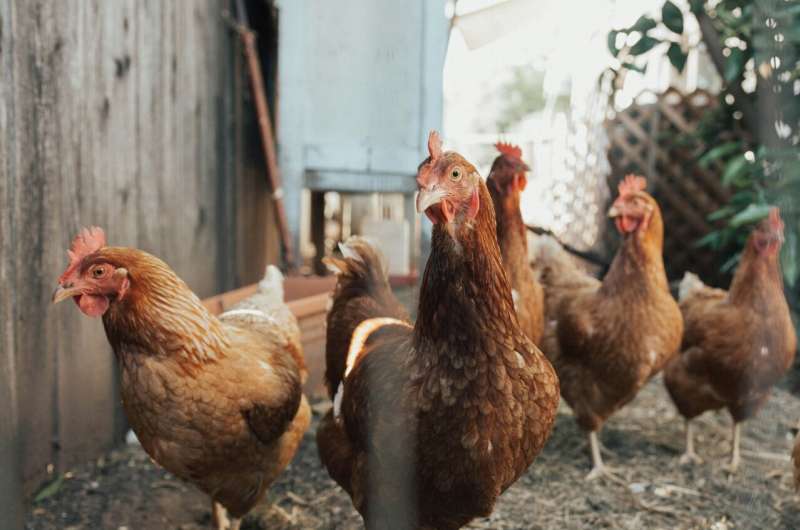Science
Study Reveals Antimicrobial Peptides Combat Salmonella in Chickens

A recent study published in Microbiology Spectrum has demonstrated that antimicrobial peptides can effectively control Salmonella infections in chickens, a finding that could enhance food safety and public health. This research highlights a potential alternative to antibiotics, addressing the rising concerns over antibiotic resistance.
Significance of Antimicrobial Peptides
The study’s corresponding author, Gireesh Rajashekara, BVSc, Ph.D., who serves as Professor and Associate Dean for Research and Advanced Studies at the University of Illinois Urbana-Champaign, emphasized the importance of these peptides. He stated, “Antimicrobial peptides have the potential to be alternatives to antibiotics and thereby could mitigate antibiotic resistance.” These peptides not only target Salmonella but also other harmful bacterial pathogens such as E. coli, making them valuable tools in combating a wide range of infections.
Salmonella is a leading cause of foodborne illnesses in the United States, with chicken and chicken products being significant vectors for transmission to humans. The study aimed to explore antibiotic alternatives to enhance food safety in poultry production.
Research Findings and Implications
Researchers identified specific antimicrobial peptides capable of killing various strains of Salmonella in laboratory conditions. They further validated that these peptides could effectively reduce Salmonella loads in chickens. The peptides’ antibacterial properties appear to stem from their interaction with the bacterial membranes.
Notably, the tested peptides maintained their effectiveness even when exposed to heat and protease treatments. These characteristics are crucial for their practical application in the poultry industry. Rajashekara noted, “We identified two antimicrobial peptides that kill many different types of Salmonella and also reduce Salmonella load in chickens.” This discovery opens avenues for developing antimicrobial solutions that could substantially improve food safety.
Looking ahead, the research team plans to conduct large-scale tests of these peptides in chickens. They aim to optimize their delivery through water or feed, better understand the mechanisms behind their action against Salmonella, and investigate additional peptides for their anti-Salmonella properties. The findings from this study could lay the groundwork for innovative strategies to control bacterial infections in poultry, ultimately benefiting public health.
For further details, refer to the full publication in Microbiology Spectrum (November 3, 2025). The continued exploration of antimicrobial peptides may play a pivotal role in enhancing food safety standards in the poultry industry.
-

 World3 weeks ago
World3 weeks agoGlobal Air Forces Ranked by Annual Defense Budgets in 2025
-

 World3 weeks ago
World3 weeks agoMass Production of F-35 Fighter Jet Drives Down Costs
-

 Top Stories3 weeks ago
Top Stories3 weeks agoNew ‘Star Trek: Voyager’ Game Demo Released, Players Test Limits
-

 Top Stories3 weeks ago
Top Stories3 weeks agoDirecTV to Launch AI-Driven Ads with User Likenesses in 2026
-

 Science3 weeks ago
Science3 weeks agoTime Crystals Revolutionize Quantum Computing Potential
-

 World3 weeks ago
World3 weeks agoElectrification Challenges Demand Advanced Multiphysics Modeling
-

 Entertainment3 weeks ago
Entertainment3 weeks agoFreeport Art Gallery Transforms Waste into Creative Masterpieces
-

 Lifestyle3 weeks ago
Lifestyle3 weeks agoDiscover Reese Witherspoon’s Chic Dining Room Style for Under $25
-

 Health3 weeks ago
Health3 weeks agoGavin Newsom Critiques Trump’s Health and National Guard Plans
-

 Lifestyle3 weeks ago
Lifestyle3 weeks agoLia Thomas Honored with ‘Voice of Inspiration’ Award at Dodgers Event
-

 Entertainment3 weeks ago
Entertainment3 weeks agoFast & Furious Coaster Hits the Track at Universal Studios
-

 Science3 weeks ago
Science3 weeks agoWaning Crescent Moon: What to Expect on October 17









